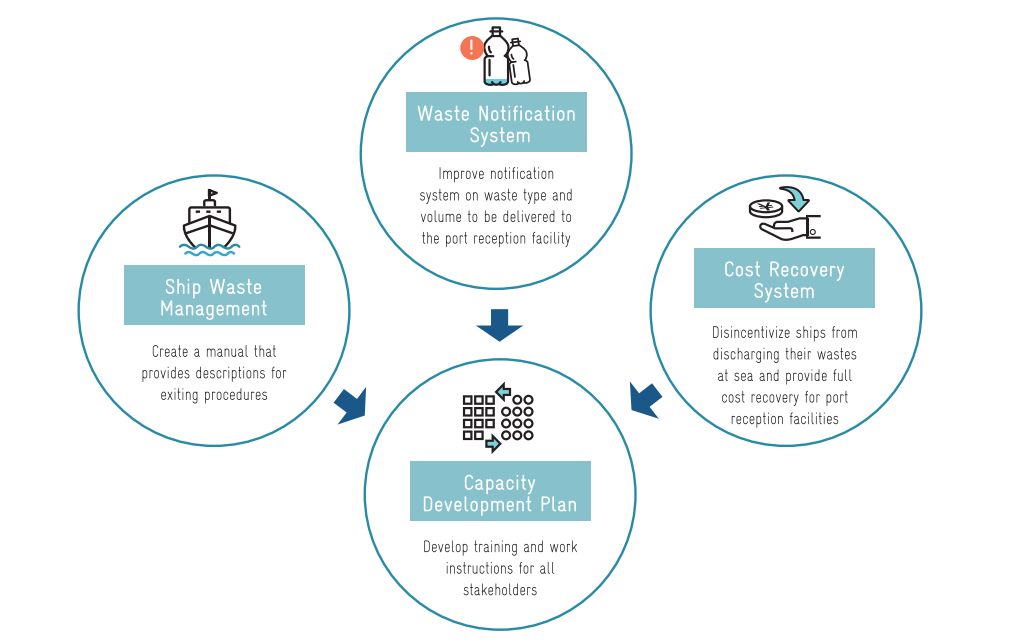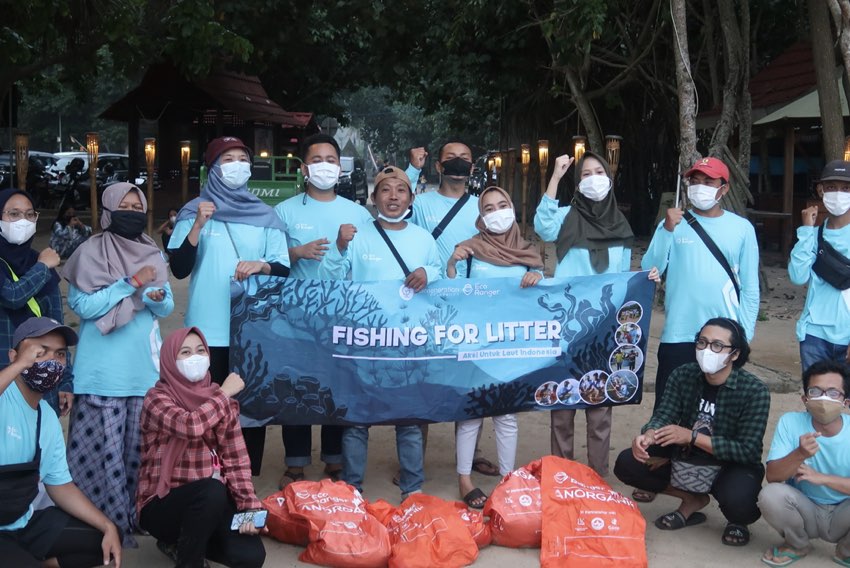Improving Ship Waste Management in Philippine Ports
Waste from ships accounts for 20% of plastic litter in the ocean. But it’s not only plastic that gets disposed of at sea: ships often dump some of the oil, sewage and hazardous materials that they generate and transport.

The more waste ends up in the sea, the more severe the consequences for marine life – and humans. We need to sustainably reduce the discharge of ship waste and cargo residues into the oceans, while ensuring the smooth operations of maritime transport. This pilot project supported Batangas Port in improving the reception and treatment of waste in the port, for example by introducing an advanced waste notification system, analysing the cost recovery system and training staff members on implementing ship waste management plans. We worked closely with the Philippine Ports Authority, the Batangas Port Management Office and national agencies such as the Philippine Coast Guard, the Department of Environment and Natural Resources and the Maritime Industry Authority.
“By improving communication between port staff and ship crew and streamlining procedures at the port, we can reduce plastic waste in our oceans. We are delighted to be working with the Philippine Ports Authority on a new online waste notification system, improved shipping information and awareness training about structural changes in waste handling by ships at ports. This makes an important contribution to ocean and coastal protection in Asia.“
Nadine Bresemann, Head of Maritime Transport at PEMSEA
WHAT HAVE WE ACHIEVED IN 17 MONTHS?
1. Legal and policy assessment
Following an analysis of the current regulatory and institutional framework for ship waste management in the Philippines, we produced a legal and policy assessment report. It includes recommendations for improving the existing framework, addressing challenges and closing gaps, and it outlines national and international best practices that could be replicated and scaled up. The report also highlights that the Philippines is complying with the requirements of MARPOL 73/78 convention, an international protocol on ship waste management.
2. Ship waste management manual
We developed a Ship Waste Management Manual for Batangas Port based on the latest processes and regulations in the Philippines and internationally. The manual describes all waste-related processes at the port, including roles and responsibilities, contacts, procedures, collection fees for accepted waste types, documents, forms and controls. It ensures transparency and provides a common reference point for partners and customers. We shared the manual with the Philippine Ports Authority (PPA) and Batangas Port Management Office, who will disseminate it to all relevant actors, such as shipping lines, terminal operators and port reception facility providers.
3. Digital ship waste notification and monitoring system
A ship waste notification system enables ships to contact ports before their arrival to register the type and the amount of waste they want to dispose of. The port authorities and waste operators can then prepare to collect the expected waste. In discussions with the PPA, we suggested including a facility for such waste notification into the existing i-PORTS system. The i-PORTS system is set to be used in all ports in the country under the jurisdiction of the PPA, including Batangas Port. The advanced online system in i-PORTS is accessible and transparent for the many actors involved, including the port reception facility provider, and allows them to prepare properly, saving time and money. It also includes an improved monitoring and reporting system. Many Philippine ports have already received an orientation, and the system is expected to be implemented following a decision by the internal PPA Management.
4. Cost recovery system
A modern cost recovery system often provides an incentive to ships to use the waste management services in ports instead of dumping waste at sea. It also makes it easier for ports and shipping agents to manage waste. We assessed the current payment system under the jurisdiction of the Philippine Ports Authority, including Batangas Port, and recommended changes which affect both international traffic and local ferry traffic between the islands. These recommendations are currently being reviewed before being implemented.
5. Training
Before implementing new systems and procedures, we had to ensure that all staff involved at the Batangas Port had the same level of expertise. With this in mind, we developed a training module together with the PPA Training Institute. We conducted a two-day seminar on ship waste management for 120 shipping line staff, shore reception facility providers, terminal operators and key stakeholders at three Philippine ports. We also trained up Training Institute staff so that they can continue teaching these seminars.
Future Recommendations
- Draw up a formal agreement and establish official channels of communication between the key partners at the port, the port authority and the implementer to ensure the smooth running of activities.
- Key partners should be informed about all aspects of project implementation from the start, for example through site visits and meetings, even if they are not actively involved until later in the project. This ensures they fully understand project activities.
- Increase the understanding of maritime agencies, particularly concerning policies, regulations and specific requirements for each agency with regard to ship waste management. Future projects should consider incorporating a component on strengthening policy/institutional mechanisms such as monitoring, evaluation and reporting.
- The two-day seminar on ship waste management was very well received by the different port stakeholders. Using the available training modules and materials, this can easily be replicated and/or scaled up in other ports in the Philippines, such as in Visayas and Mindanao. Future training on ship and port waste management could cover technologies for waste management.
- Future projects in the Philippines could consider ports that are not as centrally located and therefore not considered as often as those in Luzon, as they have fewer opportunities for technical support.
- Rather than developing a new system for online waste notification at every port, using (and potentially adapting) existing systems, such as the i-PORTS system could be more successful.
Implemented by: Partnerships in Environmental Management for the Seas of East Asia (PEMSEA) / http://www.pemsea.org/



